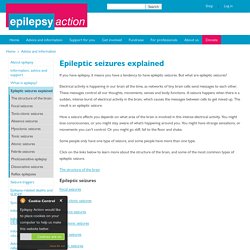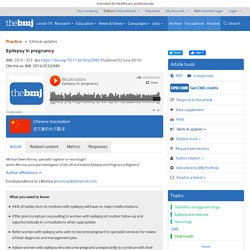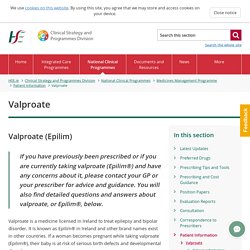

Epileptic seizures explained. Epilepsy Action would like to place cookies on your computer to help us make this website better.

Some cookies on this site are essential, and the site won't work as expected without them. These cookies are set when you submit a form, login or interact with the site by doing something that goes beyond clicking on simple links. We also use some non-essential cookies to anonymously track visitors or enhance your experience of the site. If you're not happy with this, we won't set these cookies but some nice features of the site may be unavailable. By using our site you accept the terms of our Privacy Policy.
(One cookie will be set to store your preference) (Ticking this sets a cookie to hide this popup if you then hit close. About this tool About Cookie Control. EpilepsyDiagnosis.org. Epilepsy in pregnancy updated. Epilepsy in pregnancy. In every 1000 pregnancies, between two and five infants are born to women with epilepsy.1 2 3 For such women, pregnancy can be a time of anxiety over maternal and fetal wellbeing.4 5 Most women with epilepsy will not experience an increase in seizure frequency, and in 96% of pregnancies they will deliver a healthy child.6 However, some women (between 14 and 32 per 100) will experience an increase in seizure frequency,7 which can be harmful for the mother or fetus.

There are no randomised controlled trials (RCTs) in women with epilepsy regarding antiepileptic drugs. Sources and selection criteria We performed an electronic search of PubMed for relevant English language publications over the past 10 years. The search terms “pregnancy” and “preconceptual” were individually combined with “epilepsy” as search terms. Irish Epilepsy & Pregnancy Register. Valproate (Epilim) Valproate (Epilim) If you have previously been prescribed or if you are currently taking valproate (Epilim®) and have any concerns about it, please contact your GP or your prescriber for advice and guidance.

You will also find detailed questions and answers about valproate, or Epilim®, below. Valproate is a medicine licensed in Ireland to treat epilepsy and bipolar disorder. It is known as Epilim® in Ireland and other brand names exist in other countries. If a woman becomes pregnant while taking valproate (Epilim®), their baby is at risk of serious birth defects and developmental disorders. In February 2018, the European Medicines Agency recommended new restrictions on the use of valproate (Epilim) including a Pregnancy Prevention Programme.
Valproate (Epilim®) must no longer be used in women or girls of childbearing potential unless the terms of the Valproate Pregnancy Prevention Programme are followed. Epilepsy Ireland. Powered by Ionic We would like your consent to store cookies in your web browser, to deliver the best experience we can, while you're on our site.

Choose Accept All to allow us to select the right functional, performance and marketing cookies for you. You can also opt to indicate which cookies you would like to consent to, by choosing to customise your on-site experience. This site is operated by . Dig deeper and learn more about why we need your consent, why and how we use your data, where your consent is used, how to update your preferences, and more.
This site and its partners store and access personal data based on unique identifiers such as cookies, and the EU’s General Data Protection Regulation calls for freely-given consent prior to processing any personal data. Medical Cannabis. Last Update: July 2019 The use of medicinal cannabis to treat certain types of epilepsy and other medical conditions has been a topical issue in recent times.

In this article, we will answer a number of the most frequently asked questions. Links are given throughout to further information. A list of further reading, as well as some pdf documents and videos are available at the end. What is medicinal cannabis? There are many different interpretations of what is meant by 'medicinal cannabis'. For epilepsy, much of the debate centres around cannabidiol (CBD), a non-psychoactive component of the cannabis plant that is often sold in 'oil' format. Some manufacturers of medicinal cannabis products make their products in accordance with Good Manufacturing Practice (GMP) certification.
To date, only one pharmaceutical-grade CBD medication called Epidiolex has been approved by the US FDA for use in Lennox-Gastaut syndrome or Dravet syndrome in patients 2 years of age and older. More Information. Our Research - Diagnostics, Therapeutic and eHealth. Improving Lives with Technology - HSE Lighthouse Project.
Useful Resources. Multimedia.